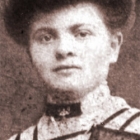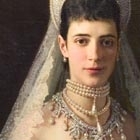Chapter Ten - Personal Valet to H.M. The Empress
After the Emperor had become Commander in Chief, and had moved Stavka to Mogilev, I was named personal Valet to H.M. the Empress, who I accompanied on her travels. When the Empress went to Stavka, she would only stay one day and visited the military hospitals under her name. The largest military hospital was at Tsarskoe Selo.
The tsarevich initially stayed at Tsarskoe Selo, and would go with the Empress to see the Emperor at Stavka at Mogilev. Later he would stay for long periods of time with the Emperor at General Headquarters.
The life of those members of the Imperial Family who had stayed at Tsarskoe Selo continued as before. They only added the daily visits by the Empress and Grand Duchesses to the hospitals. Before visiting the hospitals, the Empress and Grand Duchesses went to pray in the Church of Our Lady of Feodorovski and Znamenski. Thus life continued until the end of 1916.
Shortly before the assassination of Rasputin, a general discontent began to manifest itself, arising from the defeats at the front, as well as the influence of the Staryets in affairs of State and his influence with the Imperial Family.
Violent speeches were made in the Duma, which echoed across the great empire. During the Emperor's occasional stays in Tsarskoe Selo, the President of the Duma, M.W. Rodzianko would come often to present the sovereign with reports on the workings of the Duma.
I recall very well one of his last visits, if it was not the very last one. Rodzianko asked the courier of the Court to note how much time he spent in the Emperor's office. When he came out, the courier, taking his briefcase to carry it to his car, told Rodzianko how much time he had spent talking with the Emperor.
"That means nothing now" Rodzianko said sadly, "everything is over, irretrieviably over."
The Empress received visits from the Minister of the Court, Count Freedericks, who only knew about the business of his Ministry and never involved himself in anything else.
During the Emperor's absence, Prime Minister Goryemikin also came to make reports to the Empress, and after his dismissal (in August 1916), the successor to the post of President of the Council, M. Sturmer. Often Protopopov would come, who produced an odd impression with his overly friendly manner.
Comments on this site should be directed to Bob Atchison.

